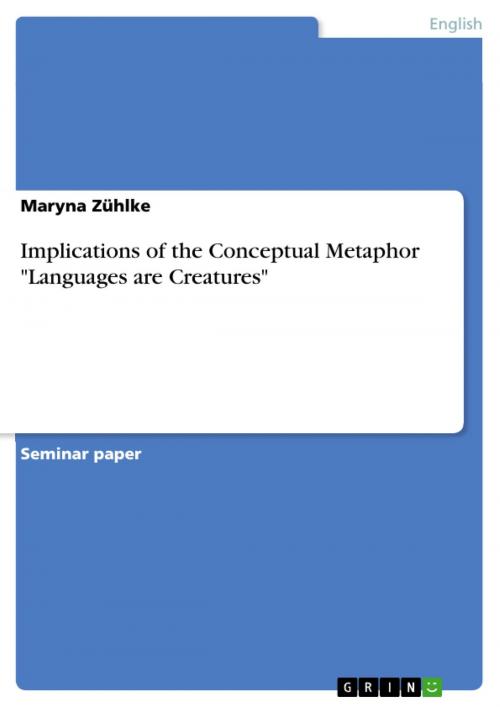Implications of the Conceptual Metaphor 'Languages are Creatures'
Nonfiction, Entertainment, Drama, Anthologies| Author: | Maryna Zühlke | ISBN: | 9783640669790 |
| Publisher: | GRIN Publishing | Publication: | July 27, 2010 |
| Imprint: | GRIN Publishing | Language: | English |
| Author: | Maryna Zühlke |
| ISBN: | 9783640669790 |
| Publisher: | GRIN Publishing |
| Publication: | July 27, 2010 |
| Imprint: | GRIN Publishing |
| Language: | English |
Seminar paper from the year 2006 in the subject English Language and Literature Studies - Linguistics, grade: 1,0, Humboldt-University of Berlin (Institut für Anglistik und Amerikanistik), course: HS The Politics of English as a Global Language, language: English, abstract: Much of today's ecolinguistic discourse is characterized by the extensive use of the conceptual metaphor LANGUAGES ARE CREATURES. The language of the Linguistic Human Rights Movement and that of such ecolinguists as MÜHLHÄUSLERand SKUTTNABB-KANGAS, to mention but a few, abound in such expressions as 'language murder' or 'linguistic genocide', especially when they engage in the criticism of post-colonial English and the so-called 'linguistic imperialism'. To unravel the knot of the problems that arise from the use of the conceptual metaphor LANGUAGES ARE CREATURES, the notion of conceptual metaphor as defined by the originators of the Conceptual Metaphor Theory George LAKOFF and Mark JOHNSON is to be dwelt on first. Second, in order to better grasp the conceptual metaphor LANGUAGES ARE CREATURES in its functioning, some of the linguistic examples structured by virtue of this conceptual metaphor will be given. Finally, some of the implications of the conceptual metaphor LANGUAGES ARE CREATURES will be indicated. In short, I would like to show what the consequences of an unrestrained use of the conceptual metaphor LANGUAGES ARE CREATURES are, how they arise from the conceptual metaphor under consideration, and why these consequences are untenable from the point of view of those linguists who structure their scholarly discourse by virtue of another conceptual metaphor, namely LANGUAGE IS A TOOL. My aim is to make the reader more sensitive to the use of metaphors in general and to the use and implications of the conceptual metaphor LANGUAGES ARE CREATURES in particular.
Seminar paper from the year 2006 in the subject English Language and Literature Studies - Linguistics, grade: 1,0, Humboldt-University of Berlin (Institut für Anglistik und Amerikanistik), course: HS The Politics of English as a Global Language, language: English, abstract: Much of today's ecolinguistic discourse is characterized by the extensive use of the conceptual metaphor LANGUAGES ARE CREATURES. The language of the Linguistic Human Rights Movement and that of such ecolinguists as MÜHLHÄUSLERand SKUTTNABB-KANGAS, to mention but a few, abound in such expressions as 'language murder' or 'linguistic genocide', especially when they engage in the criticism of post-colonial English and the so-called 'linguistic imperialism'. To unravel the knot of the problems that arise from the use of the conceptual metaphor LANGUAGES ARE CREATURES, the notion of conceptual metaphor as defined by the originators of the Conceptual Metaphor Theory George LAKOFF and Mark JOHNSON is to be dwelt on first. Second, in order to better grasp the conceptual metaphor LANGUAGES ARE CREATURES in its functioning, some of the linguistic examples structured by virtue of this conceptual metaphor will be given. Finally, some of the implications of the conceptual metaphor LANGUAGES ARE CREATURES will be indicated. In short, I would like to show what the consequences of an unrestrained use of the conceptual metaphor LANGUAGES ARE CREATURES are, how they arise from the conceptual metaphor under consideration, and why these consequences are untenable from the point of view of those linguists who structure their scholarly discourse by virtue of another conceptual metaphor, namely LANGUAGE IS A TOOL. My aim is to make the reader more sensitive to the use of metaphors in general and to the use and implications of the conceptual metaphor LANGUAGES ARE CREATURES in particular.















